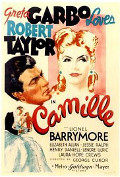
Directed by
George Cukor
108 minutes
Rated PG
Reviewed by
Bernard Hemingway

Camille
George Cukor’s adaptation of Alexandre Dumas Fils’ oft-filmed story is one of the classic Hollywood romances from a time when tragic heroines and chivalrous lovers filled the silver screen. Rarely did they do it this well.
Marguerite Gautier (Greta Garbo) is a beauty who lives off wealthy men in world-weary self-indulgence until she finally surrenders to the ardours of the handsome young Armand Duval (Robert Taylor) who, though not rich, loves her profoundly. She quits the decadent world of demi-mondaine Paris and the protection of her current lover, the Baron de Varville (Henry Daniell), for the rude pleasures of the countryside. But when Armand’s father (Lionel Barrymore) persuades her that she is ruining his son’s life she makes the ultimate sacrifice.
Whilst the core of its success remains the Dumas story with its tragic heroine, the adaptation by Zoe Akins, Frances Marion, and James Hilton is empathetic, bringing the drama to life and not leaving it a musty historical piece and the staging is persuasive with mid-nineteenth century France evoked through lush set and wardrobe design. But what really carries the day is Greta Garbo’s iconic portrayal of "La Dame Aux Camellias" (Garbo was nominated but lost to the now-forgotten Luise Rainer who remarkably became the first actress to win back-to-back Oscars).
Her Marguerite is self-interested enough to initially choose de Varville for the luxurious lifestyle he provides, yet vulnerable enough to succumb to her emotions and finally genuine enough to sacrifice everything for them. Opposite her, a very pretty (indeed, much more so than Garbo) Robert Taylor is surprisingly good as Armand and Henry Daniell is suitably phlegmatic as the old-school aristocrat who for all his superciliousness has some genuine attachment to Marguerite. Some well-measured comic relief comes in the form of Laura Hope Crews as Marguerite’s dressmaker, Jessie Ralph as her maid, Lenore Ulric as a rival courtesan and Rex O'Malley as a surprisingly loyal acquaintance.
Stylistically, particularly with respect to its performances, Camille is dated, its high passions ill-suited to our more jaded times, but it is enjoyable precisely because of this.
Want something different?





